
"With a Little Help from My Friends" is a song by the English rock band the Beatles, from their 1967 album Sgt. Pepper's Lonely Hearts Club Band. It was written by John Lennon and Paul McCartney and sung by drummer Ringo Starr, his lead vocal for the album. As the second track on the album, it segues from the applause of the title track.

"Let It Be" is a song by the English rock band the Beatles, released on 6 March 1970 as a single, and as the title track of their album Let It Be. It was written and sung by Paul McCartney, and credited to the Lennon–McCartney partnership. The single version of the song, produced by George Martin, features a softer guitar solo and the orchestral section mixed low, compared with the album version, produced by Phil Spector, featuring a more aggressive guitar solo and the orchestral sections mixed higher.
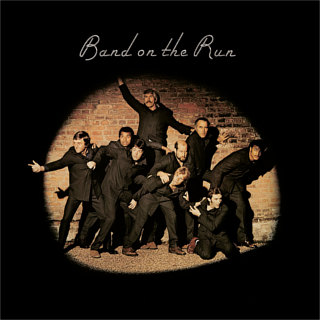
Band on the Run is the third studio album by the British–American rock band Paul McCartney and Wings, released in December 1973. It was McCartney's fifth album after leaving the Beatles in April 1970. Although sales were modest initially, its commercial performance was aided by two hit singles – "Jet" and "Band on the Run" – such that it became the top-selling studio album of 1974 in the United Kingdom and Australia, in addition to revitalising McCartney's critical standing. It remains McCartney's most successful album and the most celebrated of his post-Beatles works.
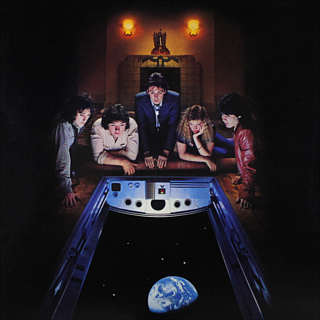
Back to the Egg is the seventh and final studio album by the British–American rock band Wings, released in June 1979 on Columbia Records in America, and on Parlophone in the UK. Co-produced by Chris Thomas, the album reflects band leader Paul McCartney's embracing of contemporary musical trends such as new wave and punk, and marked the arrival of new Wings members Laurence Juber and Steve Holley. Back to the Egg adopts a loose conceptual theme around the idea of a working band, and its creation coincided with a period of considerable activity for the group, which included making a return to touring and work on several television and film projects.
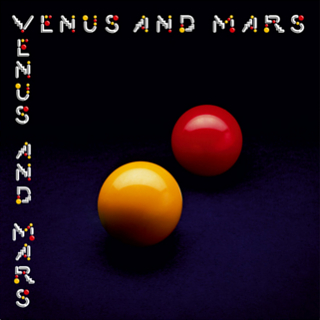
Venus and Mars is the fourth studio album by the British–American rock band Wings, and the sixth album by Paul McCartney after the break-up of the Beatles in 1970. Released in May 1975 as the follow-up to Band on the Run, Venus and Mars continued Wings' run of commercial success and provided a springboard for a year-long worldwide tour. The album was McCartney's first post-Beatles album to be released worldwide by Capitol Records rather than Apple.

Ram is the only album credited to the husband-and-wife music duo Paul and Linda McCartney, released on 17 May 1971 by Apple Records. It was recorded in New York with guitarists David Spinozza and Hugh McCracken, and future Wings drummer Denny Seiwell. Three singles were issued from the album: "Uncle Albert/Admiral Halsey", "The Back Seat of My Car" and "Eat at Home". The recording sessions also yielded the non-album single "Another Day".

Red Rose Speedway is the second studio album by the British–American rock band Wings, although credited to "Paul McCartney and Wings". It was released through Apple Records on 30 April 1973, preceded by its lead single, the ballad "My Love". By including McCartney's name in the artist credit, the single and album broke with the tradition of Wings' previous records. The change was made in the belief that the public's unfamiliarity with the band had been responsible for the weak commercial performance of the group's 1971 debut album Wild Life.

Wings at the Speed of Sound is the fifth studio album by the British–American rock band Wings, released on 25 March 1976. Issued at the height of the band's popularity, it reached the top spot on the US album chart—the band's fourth consecutive album to do so—and peaked at number 2 on the UK album chart. Both singles from the album also reached the top 5 of the UK and US singles charts, with "Silly Love Songs" reaching number 1 in the US.

EB 84 is a 1984 album by The Everly Brothers, and the duo's first album of new material in 11 years.

McCartney II is the second solo album by English musician Paul McCartney, released on 16 May 1980. It was recorded by McCartney at his home studio in the summer of 1979, shortly before the dissolution of his band Wings in 1981. Like his first solo album, McCartney (1970), he performed all the instruments himself. It yielded three singles: "Coming Up", "Waterfalls", and "Temporary Secretary".
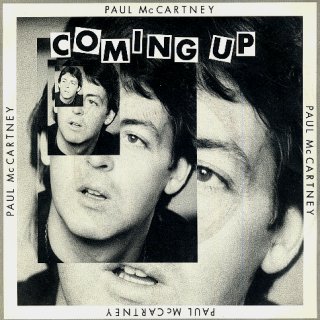
"Coming Up" is a song written and performed by English musician Paul McCartney, released as the opening track on his 1980 solo album McCartney II. Like other songs on the album, the song has a synthesised sound, featuring sped-up vocals created by using a vari-speed tape machine. McCartney played all instruments.

"Silly Love Songs" is a song by the British–American rock band Wings that was written by Paul and Linda McCartney. The song first appeared in March 1976 on the album Wings at the Speed of Sound, then it was released as a single backed with "Cook of the House" on 1 April in the US, and 30 April in the UK. The song, which features disco overtones, was written in response to music critics accusing McCartney of predominantly writing "silly love songs" and "sentimental slush".

"My Love" is a song by the British–American band Paul McCartney and Wings that was first released as the lead single from their 1973 album Red Rose Speedway. It was written by Paul McCartney as a love song to his wife and Wings bandmate Linda. The single marked the first time that McCartney's name appeared in the artist credit for a Wings record, after their previous releases had been credited to Wings alone. Released on 23 March 1973, the song topped the Billboard Hot 100 chart in the US for four weeks and peaked at number 9 on the UK Singles Chart. The single was viewed as Wings' first significant success in the US and helped Red Rose Speedway achieve commercial success.

"Live and Let Die" is the theme song of the 1973 James Bond film of the same name, performed by the British–American rock band Wings. Written by English musician Paul McCartney and his wife Linda McCartney, it reunited McCartney with former Beatles producer George Martin, who produced the song and arranged the orchestra. McCartney was contacted to write the song by the film's producers Harry Saltzman and Albert R. Broccoli before the screenplay was finished. Wings recorded "Live and Let Die" during the sessions for Red Rose Speedway in October 1972 at AIR Studios. It was also the first rock song to open a Bond film. Another version by B. J. Arnau also appears in the film.

"Band on the Run" is a song by the British–American rock band Paul McCartney and Wings, released as the title track to their 1973 album Band on the Run. The song was released as a single in April 1974 in the US and in June 1974 in the UK, following the success of "Jet", and became an international chart success. The song topped the charts in the United States, also reaching number 3 in the United Kingdom. The single sold over one million copies in 1974 in America. It has since become one of the band's most famous songs.
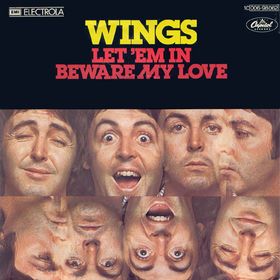
"Let 'Em In" is a song by Wings from their 1976 album Wings at the Speed of Sound. It was written and sung by Paul McCartney and reached the top 3 in the United Kingdom, the United States and Canada. It was a No. 2 hit in the UK; in the U.S. it was a No. 3 pop hit and No. 1 easy listening hit. In Canada, the song was No. 3 for three weeks on the pop chart and No. 1 for three weeks on the MOR chart of RPM magazine. The single was certified Gold by the Recording Industry Association of America for sales of over one million copies. It can also be found on McCartney's 1987 compilation album, All the Best! A demo of the song, featuring Denny Laine on lead vocal, was included as a bonus track on the Archive Collection reissue of Wings at the Speed of Sound.
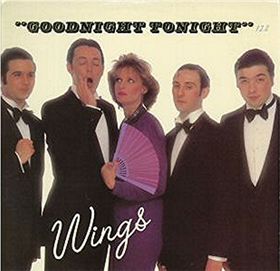
"Goodnight Tonight" is a song by the British–American rock band Wings. Written and produced by Paul McCartney, it was released as a non-album single on 23 March 1979 by Parlophone in the UK and Columbia Records in the US. It was recorded during the sessions for the band's 1979 album Back to the Egg and is notable for its disco-inflected sound and spirited flamenco guitar break.
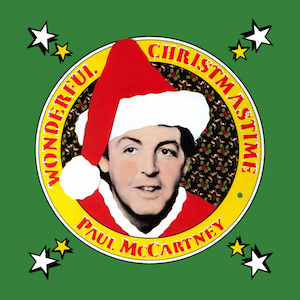
"Wonderful Christmastime" is a Christmas song by English musician Paul McCartney. Recorded during the sessions for his solo album McCartney II (1980), it was released in November 1979 following Wings' final album Back to the Egg earlier that year. It was McCartney's first solo single in over eight years since "Eat at Home" in 1971. "Wonderful Christmastime" has charted within the top 10 in Austria, Germany, Ireland, Latvia, the Netherlands, and the United Kingdom as well as the top 20 in Canada, Slovakia, Sweden, and Switzerland. Despite being regarded as one of McCartney's weaker compositions by some music critics, it is a popular song during Christmas and has been covered throughout the years by numerous artists.
Cold Cuts is an unreleased album of outtakes by Paul McCartney. The album was originally planned to be released in 1975 and McCartney revisited the project several times over the years until it was abandoned permanently in the late 1980s. The songs on the album were recorded during his solo career and with Wings in the 1970s and 1980s.

"Say Say Say" is a song by Paul McCartney and Michael Jackson, released in October 1983 as the lead single from McCartney's 1983 album Pipes of Peace. Produced by George Martin, it was recorded during production of McCartney's 1982 Tug of War album, about a year before the release of "The Girl Is Mine", the pair's first duet from Jackson's album Thriller (1982).



















